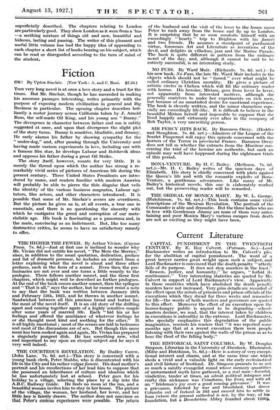THE COURTEOUS REVELATION. By Dudley Carew. (John Lane. 7s. 6d.
net.)—This story is concerned with a young bank clerk, Peter Stubbs, who is discontented with his life in the City and his rather vulgar fiancee. His dead mother's portrait and his recollections of her lead him to suppose that she possessed an inheritance of culture and idealism which lie has unfortunately lost at school. Peter goes for his holiday to a village, selecting the place by a dip into the A.B.C. Railway Guide. He finds no room at the inn, and a beautiful woman invites him to stay in her house. The picture of the village, the woman, her husband, her lover, and her little •boy is fi:intly. drawn. The author does not convince us that Peter's curious experiences were possible. The return of the husband and the visit of the lover to the house cause Peter to rush away from the house and fly up to London. It is surprising that he so soon comforts himself with an exceedingly ` hearty " trip to Brighton with his fiancée and two friends. He assumes a standpoint of puritanical virtue, forswears Art and Literature as inventions of the devil, and delights in villadom, jazz and the Marine Parade. The book is quite different in pattern from the ordinary novel of the day, and, although it cannot be said to be entirely successful, is an interesting study.






























 Previous page
Previous page